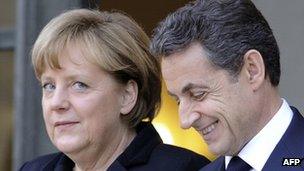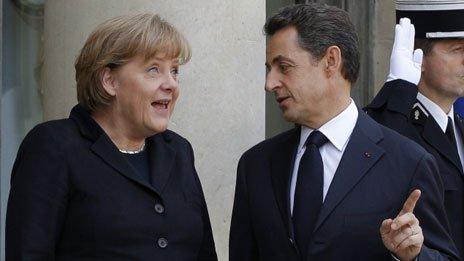Germany condemned to dominate Europe?
- Published
- comments

Mr Sarkozy (right) has enlisted Mrs Merkel (left) for his electoral campaign
The mutterings are growing. Germany - with its economic strength - is becoming too powerful. There is growing resentment at what is seen as Berlin's attempt to shape the rest of the continent to its own image.
It emerged a few days ago that Chancellor Angela Merkel would appear on the French campaign trail in support of President Nicolas Sarkozy.
Apparently it was the French president's idea. Angela Merkel is hugely respected in France. Her endorsement is no small matter.
The German chancellor sees a Socialist victory as threatening to her new pact for budgetary discipline.
Yet already French Socialists are complaining that Germany is interfering in the French elections. Some politicians complain that France has already ceded too much influence to Germany.
And what happens if Francois Hollande, the Socialist candidate, makes it to the Elysee? He will not forget where the German chancellor's loyalties lie.
German 'occupation'
And then there was the German suggestion that Greece could not be trusted to implement reforms and that an EU commissioner should in effect run its economy.
This met with outright fury in Athens.
People on the streets said: "There is no way we, as Greeks, can accept this."
"It is like an occupation," said one if them.
Even the former Prime Minister, George Papandreou, who when in power was a great advocate of solidarity, warned of the danger of "undermining democracy".
One Greek paper described it as a demand for "unconditional surrender".
The Germans have backed off - a little. They still believe they have a right to insist on fiscal discipline. Angela Merkel said that strict controls were needed "if a country doesn't comply with requirements".
Finance Minister Wolfgang Schaeuble said: "Unless Greece implements the necessary decisions and doesn't just announce them, there's no amount of money that can solve the problem."
He may be right but the Greeks do not want to be told that by Berlin.
'Back to 1945'
And then there is the culture of austerity. It has German prints all over it. But in southern Europe economies are heading into recession and the unemployment lines are growing.
It was Mario Monti, the Italian prime minister, who warned the Germans that unless they did more to ease Italy's problems, they would face growing resentment.
If austerity fails, the blame will be laid at the German door.
And then there is the fiscal pact to enforce budgetary discipline that was agreed at a summit on Monday. Structural budget deficits are to be capped at 0.5% of GDP.
This was Angela Merkel's project. She pushed for it. She wanted to end Europe's culture of running up debt.
Countries will now be severely restricted over their options if their economies are heading for a slump. One critic said it was a "straightjacket that will condemn Europe to eternal austerity and stagnation".
It is a difficult time for Germany. There are calls for German leadership. There are frequent demands on it to commit more resources to bail-out funds, firewalls and eurobonds.
But as the Suddeutsche Zeitung newspaper recognised, "Germany stands where it never wanted to stand again after 1945, as the dominant power in the middle of Europe".
- Published6 December 2011
